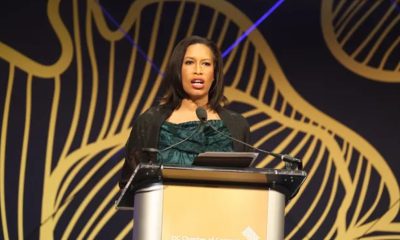Commentary
COMMENTARY: A New Verse of “We Shall Overcome” in Civil Rights 2.0
If you felt more vulnerable this July Fourth, you weren’t imagining things. You had more rights last week than you did on America’s birthday. That’s thanks to the black robes of SCOTUS. With a series of 6-3 opinions, the U.S. Supreme Court showed how far the conservative court will go to protect a dwindling white majority.

By Emil Guillermo
If you felt more vulnerable this July Fourth, you weren’t imagining things. You had more rights last week than you did on America’s birthday.
That’s thanks to the black robes of SCOTUS.
With a series of 6-3 opinions, the U.S. Supreme Court showed how far the conservative court will go to protect a dwindling white majority.
Pretty far.
Want a website for your gay wedding? No business open to the public can be forced to do one for you. In fact, any business can now legally discriminate and exclude you, if they can show it’s a matter of their free speech versus your public accommodation. The court ruled bigoted free speech wins.
Then there’s help on student loan debt. Sorry, you have to pay up. Unless you’re like a bank that passed out bad mortgages in 2008, no one’s bailing you out.
And if you were a person of color qualified to go to an Ivy league school, the laws that might have helped last week, no longer apply. And please don’t tell us what color you are. The court has told schools to be colorblind and indifferent to race.
Justice got a little harder to achieve if you aren’t white, straight, and rich.
That’s the takeaway after the high court’s grand finale. With all the news the court’s been making on its lack of ethics involving tens of thousands of dollars from billionaire right-wing donors, the current SCOTUS has proven to be more venal, human, and political than any of us could have imagined.
It’s not the elevated dispassionate body thought to rule with a sense of high-minded legal scholarship and a healthy respect for precedent.
No, the court is right there in the swamp with everything else in DC, a SCOTUS forged by politics and bias.
And if you don’t vote, it’s the court we deserve.
Want a better SCOTUS? You’ve got to register and vote.
Now, after 50 years of progress moving toward a more just society, America has a 6-3 rollback court that we should have seen coming. It started last June with Dobbs v. Jackson and the reversal on abortion.
And now it’s unsettling other aspects of our settled lives.
They’re making us go down the mountain and climb back up, singing “We shall overcome” all over again.
Don’t Blame Asian Americans
On the big issue of affirmative action, we all need to be clear. The case of Students for Fair Admissions (SFFA) v. Harvard University was not a victory for Asian Americans.
Despite the plaintiffs being Asian Americans in this case, most Asian Americans in this country were in favor of affirmative action.
If you want to point fingers, make sure you’ve got it pointing to the man who founded SFFA, and remains its leader. He’s not an Asian American, it’s the white man wearing the horned crown, Edward Blum.
Blum (rhymes with fume) is a non-lawyer, but a persistent anti-civil rights activist funded by the right wing, whose life is committed to filing lawsuit after lawsuit to undo the last 50 years. He’s made a career of neutering the Voting Rights Act and affirmative action.
Blum brought another case, Fisher v. University of Texas, before the high court in 2016 but lost. His error was using a white, female plaintiff to front the lawsuit. This time he found Asians rejected from Harvard and used them as his ‘yellow face’ to pit Asians (Blum) vs. Blacks and Latinix. And it worked.
Chief Justice John Robert’s opinion was just wrong, beginning with his application of the Equal Protection Clause of the 14th Amendment to strike down the use of race.
“The Harvard and UNC admissions programs cannot be reconciled with the guarantees of the Equal Protection Clause,” wrote Roberts. “Both programs lack sufficiently focused and measurable objectives warranting the use of race, unavoidably employ race in a negative manner, involve racial stereotyping, and lack meaningful end points.
End points? Do you mean the meter’s running on justice and fairness and at some point racists just need to run out the clock?
The use of the Equal Protection Clause got the attention of Neal Katyal, former acting Solicitor General of the United States, who said that the Equal Protection Clause only binds state actors and not private institutions like Harvard.
So, can Harvard, a private institution, violate the Equal Protection Clause?
“Legally, that’s just impossible,” said Katyal, a law school professor of more than 20 years in an interview on MSNBC. By virtue of taking federal funds Harvard could be in violation of Title VI, a federal statute, Katyal said. “But Harvard certainly didn’t violate the Constitution.”
At least Roberts didn’t formally overturn existing laws. He just removed a key single piece from the equation — race.
But Roberts did allow for a loophole:
“Nothing in this opinion should be construed as prohibiting universities from considering an applicant’s discussion of how race affected his or her life, be it through discrimination, inspiration or otherwise,” Roberts wrote. “In other words, the student must be treated based on his or her experiences as an individual — not on the basis of race.”
Well of course, for one, that would be a First Amendment issue and Roberts didn’t want to mess with that.
Justice Sotomayor said it was like “putting lipstick on a pig.” But the fact is, if you want to go to Harvard, tell your story. That hasn’t changed in 50 years.
That’s how I got in.
The Power of Affirmative Action
Frankly, the ruling made me feel a little guilty. Could I have done something to save affirmative action — more than 50 years ago?
Chief Justice John Roberts was at Harvard the same time I was there. He was just a kid and robeless back in the ’70s. But my mere presence at “that school in Boston” did not persuade young Roberts of the merits of diversity or the mutual benefits of having an underprivileged Filipino kid as part of the student body.
Because I was not just there to take. I was there to give — to America’s future leaders, like Roberts, a real world understanding beyond white preppie-dom, and to help him build the kind of empathy he’d need to have as a chief justice of the United States.
Had I succeeded — had our paths crossed — maybe Roberts would not have written such a terrible opinion that set back progress in higher education nearly 50 years.
SCOTUS just forced our hand. But there are more of us now. And we’re diverse.
Get ready for Civil Rights 2.0.
Emil Guillermo is a journalist and commentator. His “Emil Amok” monologues are on YouTube and on www.amok.com.
Activism
Big God Ministry Gives Away Toys in Marin City
Pastor Hall also gave a message of encouragement to the crowd, thanking Jesus for the “best year of their lives.” He asked each of the children what they wanted to be when they grow up.

By Godfrey Lee
Big God Ministries, pastored by David Hall, gave toys to the children in Marin City on Monday, Dec. 15, on the lawn near the corner of Drake Avenue and Donahue Street.
Pastor Hall also gave a message of encouragement to the crowd, thanking Jesus for the “best year of their lives.” He asked each of the children what they wanted to be when they grew up.
Around 75 parents and children were there to receive the presents, which consisted mainly of Gideon Bibles, Cat in the Hat pillows, Barbie dolls, Tonka trucks, and Lego building sets.
A half dozen volunteers from the Big God Ministry, including Donnie Roary, helped to set up the tables for the toy giveaway. The worship music was sung by Ruby Friedman, Keri Carpenter, and Jake Monaghan, who also played the accordion.
Big God Ministries meets on Sundays at 10 a.m. at the Mill Valley Community Center, 180 Camino Alto, Mill Valley, CA Their phone number is (415) 797-2567.
Activism
2025 in Review: Seven Questions for Assemblymember Lori Wilson — Advocate for Equity, the Environment, and More
Her rise has also included several historic firsts: she is the only Black woman ever appointed to lead the influential Assembly Transportation Committee, and the first freshman legislator elected Chair of the California Legislative Black Caucus. She has also been a vocal advocate for vulnerable communities, becoming the first California legislator to publicly discuss being the parent of a transgender child — an act of visibility that has helped advanced representation at a time when political tensions related to social issues and culture have intensified.

By Edward Henderson, California Black Media
Assemblymember Lori D. Wilson (D-Suisun City) joined the California Legislature in 2022 after making history as Solano County’s first Black female mayor, bringing with her a track record of fiscal discipline, community investment, and inclusive leadership.
She represents the state’s 11th Assembly District, which spans Solano County and portions of Contra Costa and Sacramento Counties.
Her rise has also included several historic firsts: she is the only Black woman ever appointed to lead the influential Assembly Transportation Committee, and the first freshman legislator elected Chair of the California Legislative Black Caucus. She has also been a vocal advocate for vulnerable communities, becoming the first California legislator to publicly discuss being the parent of a transgender child — an act of visibility that has helped advanced representation at a time when political tensions related to social issues and culture have intensified.
California Black Media spoke with Wilson about her successes and disappointments this year and her outlook for 2026.
What stands out as your most important achievement this year?
Getting SB 237 passed in the Assembly. I had the opportunity to co-lead a diverse workgroup of colleagues, spanning a wide range of ideological perspectives on environmental issues.
How did your leadership contribute to improving the lives of Black Californians this year?
The Black Caucus concentrated on the Road to Repair package and prioritized passing a crucial bill that remained incomplete during my time as chair, which establishes a process for identifying descendants of enslaved people for benefit eligibility.
What frustrated you the most this year?
The lack of progress made on getting Prop 4 funds allocated to socially disadvantaged farmers. This delay has real consequences. These farmers have been waiting for essential support that was promised. Watching the process stall, despite the clear need and clear intent of the voters, has been deeply frustrating and reinforces how much work remains to make our systems more responsive and equitable.
What inspired you the most this year?
The resilience of Californians persists despite the unprecedented attacks from the federal government. Watching people stay engaged, hopeful, and determined reminded me why this work matters and why we must continue to protect the rights of every community in our state.
What is one lesson you learned this year that will inform your decision-making next year?
As a legislator, I have the authority to demand answers to my questions — and accept nothing less. That clarity has strengthened my approach to oversight and accountability.
In one word, what is the biggest challenge Black Californians are facing currently?
Affordability and access to quality educational opportunities.
What is the goal you want to achieve most in 2026?
Advance my legislative agenda despite a complex budget environment. The needs across our communities are real, and even in a tight fiscal year, I’m committed to moving forward policies that strengthen safety, expand opportunity, and improve quality of life for the people I represent.
Activism
2025 in Review: Seven Questions for Assemblymember Tina McKinnor, Champion of Reparations, Housing and Workers’ Rights
In 2025, McKinnor pushed forward legislation on renters’ protections, re-entry programs, reparations legislation, and efforts to support Inglewood Unified School District. She spoke with California Black Media about the past year and her work. Here are her responses.

By Joe W. Bowers Jr., California Black Media
Assemblymember Tina McKinnor (D-Inglewood) represents
California’s 61st Assembly District.
As a member of the California Legislative Black Caucus (CLBC),
McKinnor was elected in 2022. She chairs the Los Angeles County Legislative Delegation and leads the Assembly Public Employment and Retirement Committee. McKinnor also served as a civic engagement director, managed political campaigns, and worked as chief of staff for former Assemblymembers Steven Bradford and Autumn Burke.
In 2025, McKinnor pushed forward legislation on renters’ protections, re-entry programs, reparations legislation, and efforts to support Inglewood Unified School District. She spoke with California Black Media about the past year and her work. Here are her responses.
Looking back on 2025, what do you see as your biggest win?
Assembly Bill (AB) 628. If rent is $3,000, people should at least have a stove and a refrigerator. It’s ridiculous that people were renting without basic appliances.
I’m also proud that I was able to secure $8.4 million in the state budget for people coming home from incarceration. That includes the Homecoming Project, the menopause program for incarcerated women, and the Justice Leaders Program.
How did your leadership help make life better for Black Californians this year?
After the Eaton Fire, I pushed to get the same kind of support for affected areas that wealthier regions get after disasters.
I also did a lot of work building political power— establishing the Black Legacy PAC and California for All of Us PAC so we could support Black candidates and educate voters. We also called voters to make sure they understood Prop 50.
People need to understand this: there are only 12 Black legislators in the Capitol. Folks act like we can just walk in and pass reparations, but that’s not how it works.
What frustrated you most this year?
The governor did not have the political will to sign these bills: AB 57 and AB 62. They both passed overwhelmingly in the Assembly and the Senate. We did the work. The only person who didn’t have the political will to sign them was the governor.
The public needs to ask the governor why he didn’t sign the bills. We can’t keep letting people off the hook. He has to answer.
I also introduced AB 51 — the bill to eliminate interest payments on Inglewood Unified School District’s long-standing state loan — held in the Appropriations Committee. That was frustrating,
What inspired you most in 2025?
The civil rights trip to Alabama was life changing. We visited the Legacy Museum and the National Memorial for Peace and Justice. We took members of the Black, Latino, Jewish, and API caucuses with us. It changed all of us.
People aren’t always against us — they just don’t know our history.
What’s one lesson from 2025 that will shape how you approach decisions next year?
The legislative trip to Norway taught me that collaboration matters. Government, labor, and industry sit down together there. They don’t make villains. Everybody doesn’t get everything they want, but they solve problems.
What’s the biggest challenge facing Black Californians in one word?
Inequity. It shows up in housing, wealth, stress – all these things.
What’s the number one goal you want to accomplish in 2026?
Bringing back AB 57 and AB 62, and securing money for the Inglewood Unified loan interest forgiveness.
-

 #NNPA BlackPress4 weeks ago
#NNPA BlackPress4 weeks agoLIHEAP Funds Released After Weeks of Delay as States and the District Rush to Protect Households from the Cold
-

 Alameda County4 weeks ago
Alameda County4 weeks agoSeth Curry Makes Impressive Debut with the Golden State Warriors
-

 #NNPA BlackPress4 weeks ago
#NNPA BlackPress4 weeks agoSeven Steps to Help Your Child Build Meaningful Connections
-

 #NNPA BlackPress4 weeks ago
#NNPA BlackPress4 weeks agoSeven Steps to Help Your Child Build Meaningful Connections
-

 #NNPA BlackPress4 weeks ago
#NNPA BlackPress4 weeks agoTrinidad and Tobago – Prime Minister Confirms U.S. Marines Working on Tobago Radar System
-

 #NNPA BlackPress4 weeks ago
#NNPA BlackPress4 weeks agoThanksgiving Celebrated Across the Tri-State
-

 #NNPA BlackPress4 weeks ago
#NNPA BlackPress4 weeks agoTeens Reject Today’s News as Trump Intensifies His Assault on the Press
-

 #NNPA BlackPress4 weeks ago
#NNPA BlackPress4 weeks agoBreaking the Silence: Black Veterans Speak Out on PTSD and the Path to Recovery



















































